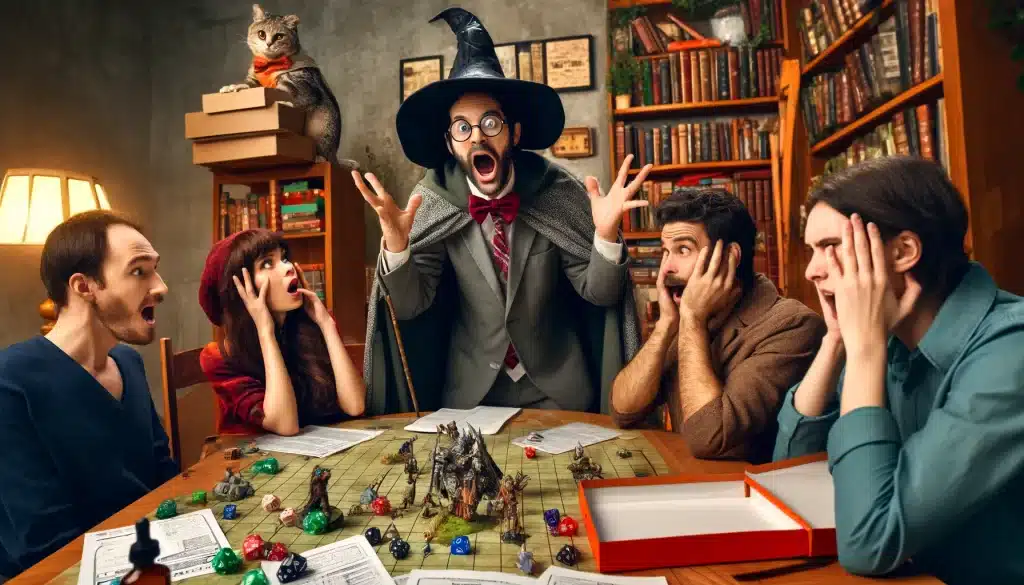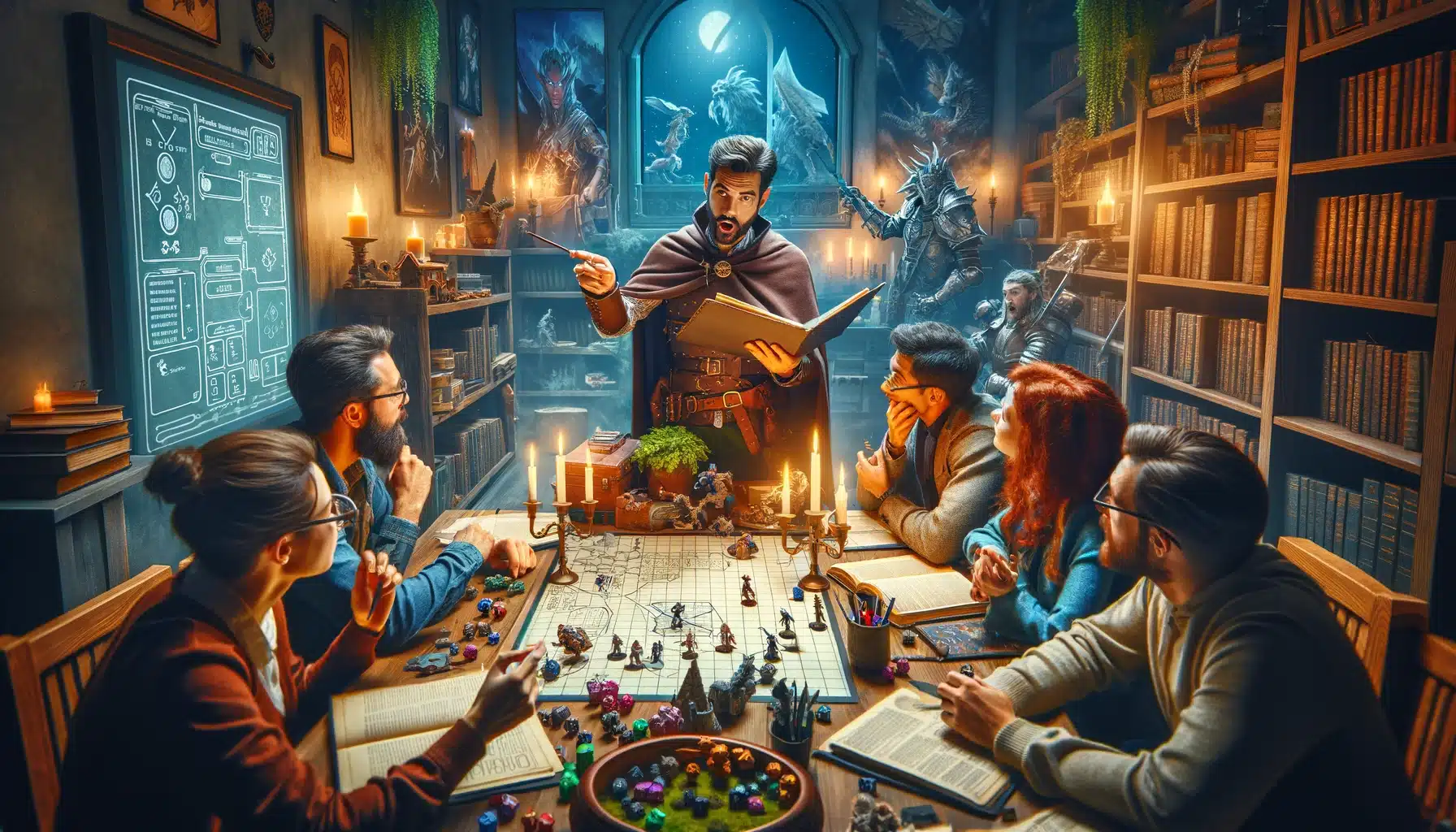As a seasoned Dungeon Master, I’ve navigated the chaotic realms of Dungeons & Dragons, where every session is a blend of meticulous planning and spontaneous creativity. Over the years, I’ve seen epic battles, hilarious mishaps, and unforgettable character arcs unfold at my table. Through trial and error, I’ve honed my craft, learning what keeps players engaged and the story compelling.
In this blog post, I’ll share some of the hard-earned wisdom and practical tips I’ve gathered. Whether you’re crafting your first campaign or refining your technique, these insights will help you create a rich, immersive experience for your players. From world-building and character development to managing the unpredictable nature of player decisions, I’ll cover the essentials that every Dungeon Master needs to know.
Remember, being a DM is as much about storytelling as it is about mechanics. It’s about weaving a narrative that captivates your players, encouraging their creativity while steering them towards epic adventures. So, grab your DM screen, your favorite set of dice, and let’s delve into the art of mastering the dungeon!
Preparing Your Campaign
Creating a memorable Dungeons & Dragons campaign starts with thorough preparation. The first step is world-building. Craft a setting that feels alive, with its own history, geography, and cultures. Think about the major factions, their goals, and how they interact with each other. Use resources like campaign setting books, maps, and lore to flesh out the details. Your world should provide a rich backdrop for the adventures to come, giving your players a sense of immersion and continuity.
Next, focus on the story arc. Develop a central plot that will drive the campaign forward. This could be a grand quest, a looming threat, or a mystery to unravel. Break down the main plot into manageable story beats, ensuring there’s a mix of combat, exploration, and role-playing opportunities. Think about the pacing and how each session will contribute to the overall narrative. Remember, while you may have a clear story in mind, be flexible to adapt based on your players’ actions and choices.
Character development is crucial. Create a cast of compelling NPCs (non-player characters) that your players will interact with. These characters should have distinct personalities, motivations, and relationships. Think about how they fit into the story and the world. Good NPCs can provide vital information, present challenges, and enrich the players’ experience. Additionally, encourage your players to develop their backstories, which can be woven into the campaign for added depth and personal stakes.
Try my AI Tabletop RPG generators...and an extensive library of content!
Finally, prepare for the unexpected. Players will inevitably come up with creative solutions and off-the-wall ideas that you didn’t anticipate. Embrace this spontaneity and be ready to improvise. Have a few side quests or random encounters prepared that you can drop in when needed. Keeping an open mind and being adaptable will help you manage the game smoothly and keep the story engaging, no matter where your players’ choices take them.
Character and NPC Development
Crafting memorable characters and NPCs is vital to a successful D&D campaign. Start with your players’ characters. Encourage them to create detailed backstories, motivations, and personalities. These elements will provide you with hooks to integrate their characters into the main story, creating a more personal and engaging experience.
NPCs, on the other hand, should serve various roles within your campaign. Create a diverse array of allies, adversaries, and neutrals who can interact with the players. Each NPC should have distinct traits, goals, and backgrounds. This diversity will make the world feel more realistic and dynamic.
Develop relationships between NPCs and players’ characters. Use these interactions to reveal plot points, offer quests, or create conflicts. For instance, a friendly NPC might provide critical information or assistance, while an antagonist NPC could drive the story forward through opposition and intrigue.
⚔️ Fantasy RPG Random Tables Books
Make life as a Gamemaster easier…
If you play Dungeons & Dragons, Pathfinder, or other fantasy RPGs, this
RPG random tables series
is packed with encounters, NPCs, treasure, and more. Available in eBook or print—either way, you’ll have a wealth of adventure ideas at your fingertips.
Lastly, be ready to improvise with NPCs. Players often form attachments to unexpected characters, so be prepared to develop minor NPCs further if they become important to the story. This flexibility will enhance the depth and richness of your campaign, making it more immersive and enjoyable for your players.

Running Smooth Sessions
Running a smooth D&D session is an art that balances preparation, flexibility, and player engagement. Here’s how to keep the game flowing and your players immersed:
Start by setting the scene vividly. Describe environments, sounds, and smells to draw players into the world. This helps set the tone and engages their imaginations right from the start.
During the game, keep the following tips in mind:
- Pace Yourself: Avoid dragging out combat or overly detailed descriptions. Keep things moving to maintain energy.
- Read the Room: Pay attention to players’ body language and reactions. If they seem bored or confused, switch things up.
- Encourage Role-Playing: Foster interaction by asking characters questions and involving them in the narrative.
- Be Ready to Improvise: Players will inevitably do the unexpected. Have a few generic encounters or plot points ready to adapt on the fly.
When conflicts arise, whether between players or within the game, handle them with diplomacy. Keep the game fun for everyone by mediating disputes and ensuring all voices are heard.
Finally, end sessions on a high note. Leave a cliffhanger or a significant revelation to keep your players excited for the next game. With these techniques, you’ll run smooth, enjoyable sessions that your players will look forward to week after week.
Creative Combat Scenarios
Creating engaging combat scenarios in D&D is essential to keep your players on their toes. Here are some ways to spice up your battles:
Environmental Hazards
Incorporate elements like:
- Collapsing Bridges: Players must fight while avoiding falling.
- Raging Fires: Damage zones and limited visibility.
Unique Objectives
Go beyond simple brawls with goals like:
- Rescue Missions: Save hostages amidst combat.
- Artifact Retrieval: Secure a powerful item while battling foes.
Dynamic Enemies
Introduce creatures with special abilities:
- Teleporting Foes: Enemies that blink around the battlefield.
- Regenerating Monsters: Require specific tactics to defeat.
Interactive Terrain
Use the environment to add complexity:
- Traps and Triggers: Activating traps to hinder enemies.
- Movable Obstacles: Push boulders or topple statues to change the battlefield.
Multi-Phase Battles
Design encounters that evolve:
- Reinforcements Arrive: Additional enemies join mid-fight.
- Boss Transformations: The main villain changes form, altering their abilities and strategy.
Mixing these elements will keep combat fresh, challenging, and exhilarating for your players.
Incorporating Player Feedback
Incorporating player feedback is crucial for maintaining an engaging and enjoyable D&D campaign. Start by fostering an open dialogue with your players. Encourage them to share their thoughts on the campaign, characters, and storylines. Regularly check in with them, either after sessions or through anonymous surveys, to gather honest feedback.
Listen actively to their suggestions and concerns. If a particular aspect of the game isn’t resonating, be willing to make adjustments. This could mean tweaking the difficulty of encounters, introducing new plot elements, or shifting the focus to better align with players’ interests.
Balance their input with your vision. While it’s important to consider their feedback, remember that you are the storyteller. Find a middle ground where player preferences and your creative direction intersect. This ensures everyone feels heard and invested in the game.
Finally, show appreciation for their input by implementing their ideas where feasible. When players see their suggestions influencing the game, it fosters a collaborative atmosphere and strengthens their engagement. By valuing and integrating player feedback, you create a dynamic and responsive campaign that everyone can enjoy.
Become a Better DND DM
Being a Dungeon Master is a continuous journey of learning and adaptation. By preparing thoroughly, developing rich characters and NPCs, running smooth sessions, creating dynamic combat scenarios, and incorporating player feedback, you’ll craft a memorable and engaging D&D campaign. Remember, the goal is to create an immersive experience that everyone enjoys.
Thank you for joining me on this exploration of essential DM tips. Whether you’re just starting out or have countless campaigns under your belt, I hope these insights help you elevate your game. Now, go forth and create epic adventures!
⚔️ Fantasy RPG Random Tables Books
Make life as a Gamemaster easier…
If you play Dungeons & Dragons, Pathfinder, or other fantasy RPGs, this
RPG random tables series
is packed with encounters, NPCs, treasure, and more. Available in eBook or print—either way, you’ll have a wealth of adventure ideas at your fingertips.










